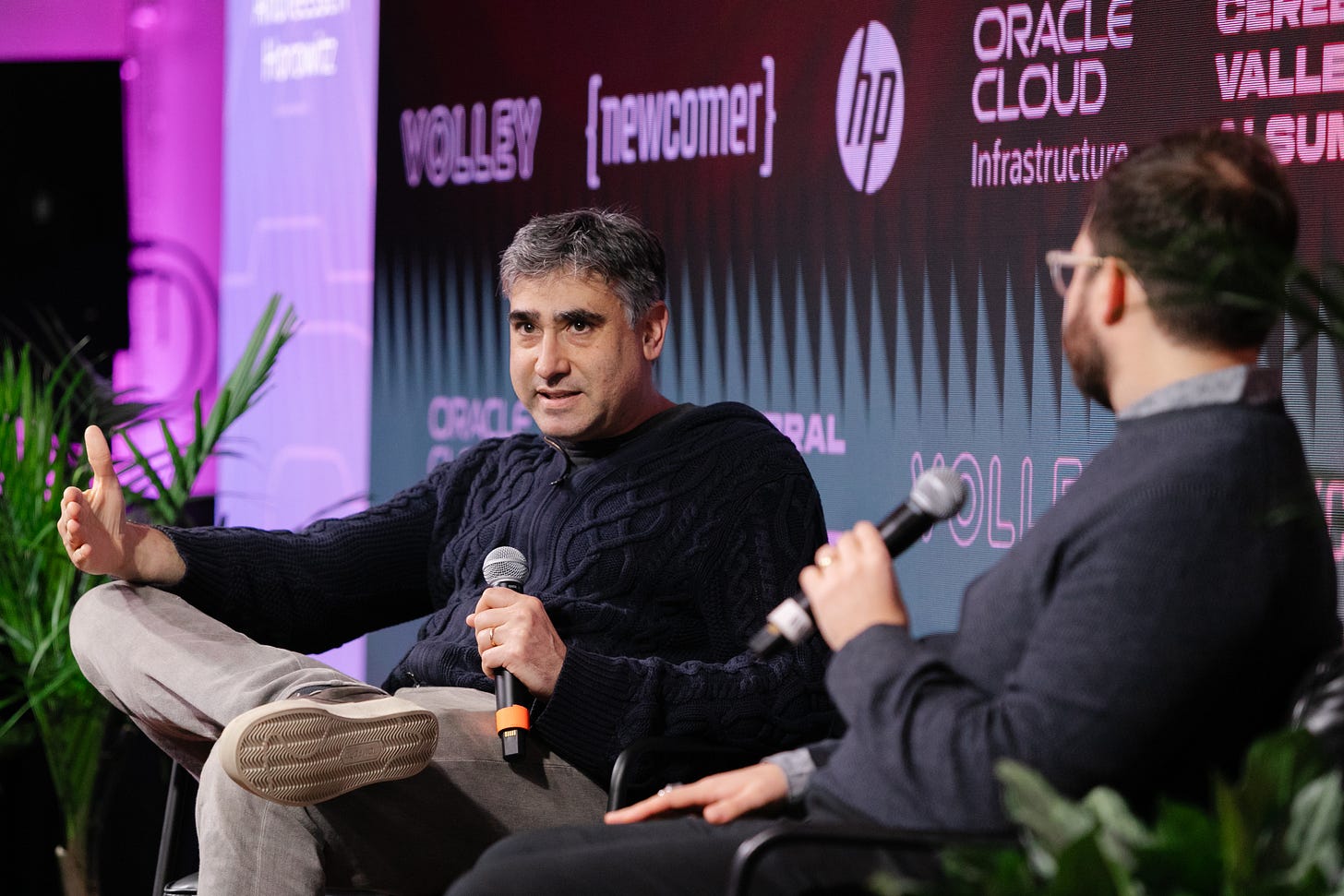Martin Casado Isn't Backing Down. You Can't Ignore the VC Consensus.
Plus, former congressman Will Hurd talks the defense-tech boom
The Week in Short
Andreessen Horowitz’s Martin Casado explains himself. Former congressman Will Hurd talks about how Washington is opening the door for a defense-tech boom.
Behind the paywall: Secondaries sales only capture a fraction of the value of all the unicorns that are stuck in private markets. Nvidia posts massive revenue growth, but it still isn’t enough to quell Wall Street jitters. AI startups spend big to lobby Congress with a new PAC. A lawsuit accuses OpenAI of aiding in a teenager’s wrongful death. Meta’s AI teams are already losing engineers. Klarna plans to restart its IPO effort.
VCs Are Herd Animals, But It’s Not PE
Sometimes an idea hits like a doctor’s hammer: the reaction is so strong and immediate because it taps into our inner-most hardwiring.
For those of us interested in venture capital portfolio construction, Andreessen Horowitz infrastructure czar Martin Casado struck one such nerve when he posted on X,
The idea that non consensus investing is where the alpha is, is actually quite dangerous in the early stage.
Follow on capital tends to be more and more consensus aligned.
The tweet seemed to cut against how venture capitalists prefer to see themselves: they’re free-thinkers who march to the beat of their own drum, buck the mold, and pick a needle out of a haystack. Investors like Keith Rabois, Leo Polovets, and Mike Maples jumped in with reactions to Casado’s post.
It wasn’t just investors’ self-conception that the post was flouting, but it also seemed to speak to how Andreessen Horowitz, with its massive war chest, has the privilege of seeing the startup world differently from everyone else (and mucking up how the game is played in the process).
I caught up with Casado yesterday to unpack his comment and to see where one of Silicon Valley’s most important venture capitalists’ head is at right now.
He’s not backing down.
“I think it’s absolutely true and I actually think it’s a great position to take,” Casado said.
Unpacking the point with him, what he’s really trying to assert is that early stage rounds are part of an efficient market. He’s saying that startups that go on to succeed will have tended to raise at higher prices in those early rounds than companies that fail. (He’s working on sorting through a16z’s proprietary data to see if he can back that up with actual numbers.)
Casado acknowledges that at their inception great ideas are not always obvious and that many great startups had a hard round where they lost favor with investors. But on average, he argues, successful startups fit into a mold that investors understand, and that more often than not those startups attracted meaningful competition among top investors.
Casado said very, very few VCs are actually contrarians. Besides Peter Thiel, he asked “who is a true contrarian?”
What matters in venture capital these days, he said, “it’s access, it’s winning , and it’s having the right fund structure to be able to enter the casino.”
I wondered if this was all a roundabout way of saying that venture capital was turning into private equity. Was venture becoming a more standardized, well-understood, and scaled business? But even Casado could not stomach the private equity comparison.
“Private equity is literally about predictable returns,” he said. “The beta is entirely different — just because the price is right doesn’t mean the beta isn’t enormous.”
In other words, venture capitalists are far more willing to accept the idea that a highly-valued company implodes since they’re betting on tremendous upside — that is the hard line between VC and private equity even as venture has become a big-money, highly competitive business.
Some investors have convinced themselves that venture suffers from a Babe Ruth Effect, where the biggest hitters also have the biggest misses. But Casado says he doesn’t think that’s true. Some investors get lucky and hit a really big swing after a lot of misses, but the top investors are able to find some consistency.
That investors tend to cluster around certain themes and founder-types isn’t a surprise to the people actually trying to raise money from them.
“Founders know what I’m saying is true if the investors don’t seem to,” Casado said about his post. “You need to build a non-consensus product but you need to give a consensus pitch to investors.”
Newcomer Podcast
Will Hurd on Silicon Valley's Defense-Tech Gold Rush
Ex-Congressman Will Hurd joins Eric, Tom, and Madeline this week to unpack the defense-tech boom in Silicon Valley.
Ukraine has changed the game for the face of warfare, says Hurd, and founders are now flocking to Southern California to build the tools for our future conflicts, Madeline reports.
We discuss how to really sell to the Pentagon, LA’s role as a hub for the new defense tech wave, and Hurd's own Chaos Industries and their modular counter-drone systems. We also can’t help it but to talk politics.




